|
|
|
Sort Order |
|
|
|
Items / Page
|
|
|
|
|
|
|
| Srl | Item |
| 1 |
ID:
126864


|
|
|
| 2 |
ID:
121616
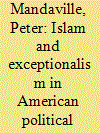

|
|
|
|
|
| Publication |
2013.
|
| Summary/Abstract |
The phenomenal success achieved by Islamic political parties in the wake of the Arab uprisings of 2011 is one of the most significant and frequently noted developments to follow from those momentous events. Within a few months of the demise of long-standing authoritarian regimes, Islamist groups that had been banned and oppressed for decades found themselves flourishing. Soon El-Nahda in Tunisia and then Egypt's Muslim Brotherhood tasted victory in constituent assembly, legislative, and eventually presidential elections. A new area of political Islam in power had seemingly arrived.
|
|
|
|
|
|
|
|
|
|
|
|
|
|
|
|
| 3 |
ID:
121485
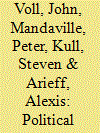

|
|
|
| 4 |
ID:
096548
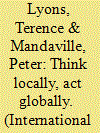

|
|
|
|
|
| Publication |
2010.
|
| Summary/Abstract |
Political dynamics and outcomes around the globe have been transformed by globalization, new patterns of human mobility, and the development of innovative transnational social networks. These new political processes are rooted in communities and networks that are not restricted by geographic location. Although politics has been delinked from territory in this way with regard to processes and actors, this does not mean that transnational politics focuses exclusively on universal issues or global approaches to social justice. Rather much of the new transnational politics is intensely focused on specific locations, identities, and issues (for example, "globalized" neighborhood associations, ethnicities, patrimonialism). Transnational politics also includes new conceptions and practices of citizenship and accountability (for example, legislative seats reserved for expatriate labor migrants) as the body politic becomes increasing mobile, political affinities delinked from geographic proximity, and critical constituencies reside outside of the territory of the state. This article outlines a new approach to investigating the actors and processes at the heart of contemporary transnational politics, with a particular focus on the ways in which diasporas are strategically constructed and mobilized to advance political goals through the use of salient symbols, identity frames, and social networks.
|
|
|
|
|
|
|
|
|
|
|
|
|
|
|
|
| 5 |
ID:
049278
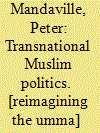

|
|
|
|
|
| Publication |
London, Routledge, 2001.
|
| Description |
xiii, 235p.
|
| Series |
Transnationalism
|
| Standard Number |
9780415246941
|
|
|
|
|
|
|
|
|
|
|
|
Copies: C:1/I:0,R:0,Q:0
Circulation
| Accession# | Call# | Current Location | Status | Policy | Location |
| 044752 | 291.177/MAN 044752 | Main | On Shelf | General | |
|
|
|
|
| 6 |
ID:
102822
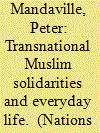

|
|
|
|
|
| Publication |
2011.
|
| Summary/Abstract |
Discussions of globalisation and identity have focused on the renewed relevance of various post-national frameworks of belonging, including the Muslim umma. This article argues against the idea that the umma has come to constitute a primary referent in contemporary Muslim debates about identity or a form of globalised political consciousness. Furthermore, the advent of 'post-Islamism' means that Islamic political mobilisation rarely seeks to establish alternative political orders within the container of the nation-state. However, this does not mean that we are seeing a reaffirmation of the nation in Muslim contexts today. Rather, transnational Muslim solidarities represent an intermediate space of affiliation and socio-political mobilisation that exists alongside and in an ambivalent relationship with the nation-state. I point to two different socio-religious movements that, without positing the primacy or exclusivity of the umma/Islamic identity, express discrepant visions of the relationship between Islam and the nation: (1) the Fethullah Gülen movement, which serves simultaneously as the vehicle for a particular vision of neo-Ottoman Turkish nationalism and a critique of the Kemalist national order; and (2) the neo-Salafist movement, read here as an effort to embed conceptions of public morality and accountability within the discursive tradition of orthodox Islam rather than the institutional framework of modern polity.
|
|
|
|
|
|
|
|
|
|
|
|
|
|
|
|
| 7 |
ID:
187780
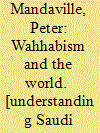

|
|
|
|
|
| Publication |
New York, Oxford University Press, 2022.
|
| Description |
xv, 326p.pbk
|
| Series |
Religion and Global Politics
|
| Standard Number |
9780197532577
|
|
|
|
|
|
|
|
|
|
|
|
Copies: C:1/I:0,R:0,Q:0
Circulation
| Accession# | Call# | Current Location | Status | Policy | Location |
| 060244 | 297.9/MAN 060244 | Main | On Shelf | General | |
|
|
|
|
|
|
|
|
|